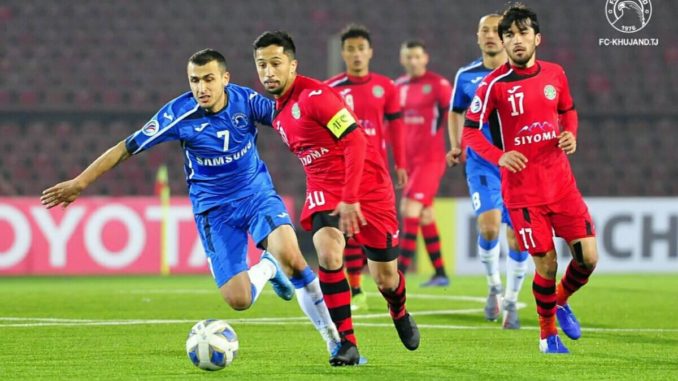
With a near total lockdown of football the world over due to the COVID-19 pandemic outbreak, Tajikistan is set to become the next global curiosity, as it welcomes back domestic football for its season opener this coming weekend.
The coronavirus spread has touched near enough every country on the planet to date, yet Central Asia, despite its close proximity to the virus’ reputed source in China, has so far been minimally affected.
Domestic football as a consequence has been relatively untouched up until very recently. The Uzbek Super League played in front of well attended stadiums well into March, while domestic campaigns in Kyrgyzstan and Turkmenistan only postponed their footballing activity two weekends ago.
This leaves Tajikistan alone as not only the region’s last bastion against footballing lockdown, but potentially the world’s last hope to witness live sport.
There remains no confirmed cases of COVID-19 in the country to date; and while you’re right to be skeptical over such reporting, the Tajik Football Federation, backed by the national government, are clear that such positive news means business as usual for football.
From a purely capitalist standpoint, you can clearly see their logic. You only need to look at the increase in attention it has brought Belarus of late, who’s domestic Premier League (Vysshaya Liga locally, as is the case in Tajikistan) has been strewn across numerous worldwide news outlets such as the BBC and the New York Times, seeking out a unique story in this time of inactivity, whilst being flung into the glare of the multi-billion pound industry of online gambling, who’ve similarly jumped on the only available product around to churn money out of.
There is more than a whiff of opportunism about the resumption of the Tajik Higher League at this point. Central to a region which has only just entered into lockdown, too eager to enact the start of a season that given its size could have easily been postponed to later in the year, seems all too convenient, even if the opening rounds are wisely being hosted behind closed doors.
The domestic league’s insistence in reappearing in such a chaotic time comes as little surprise, however, given the trajectory of the sport in the country and the success its peddling at national team level.
The senior team are well placed to make a real fist of qualifying for a debut AFC Asian Cup in 2023, if not a latter stage World Cup qualification run, while their under age groups are attracting more and more scouts from Europe and the Middle East; prolific young striker Shahrom Samiyev the latest young talent to move on, to Rubin Kazan in Russia.
Their success has come in direct opposition to the support it receives from the country’s higher powers, however. Tajikistan is a typically poor country, poorer than its direct neighbours, but even more polarised in its wealth distribution between the very rich ruling class and the impoverished general population.
Instead a footballing revolution of sorts has come in the frame of the inspirational yet rugged figure of Usmon Toshev. The passionate Uzbek coach, who arrived in Tajikistan back in 2018 after a modest career that has a spell in Afghanistan as its highlight, has reinvigorated all levels of the game, and given them a purpose in which to work for.
As he often admits, Tajikistan isn’t necessarily blessed with the highest calibre of players, but crucially they haven’t been cared for in the past, hence the significant improvements that have been made in such a short space of time.
An improved infrastructure is slowly but surely establishing the national team picture in the twenty-first century, a positive energy which the government has been all too willing to piggyback on. The next stage of goodwill and economic boost will, it hopes, come from the domestic game.
Assistance in the league is similarly disporate; much of it being funnelled down to one single club, Dushanbe based Istiklol. Formed only in 2007, the club have been nothing short of dominant domestically ever since, winning at a canter the last six league titles, clinching the domestic treble in both of the last two seasons.
Whenever a team gets close to them, Istiklol are the only side with the financial muscle, or more increasingly the greatest contacts to turn a young player’s head in moving to them. In such a inversed society, it comes as no surprise that there’s such a division within sport.
Istiklol’s ties to the Tajik government are highly distinct; the president’s son Rustam Emomali, who once played for the club, is now their official owner, and has already been criticised for influencing referees and football federation officials to assist his team.
While the running of the club is morally questionable, the way the team plays on the pitch has become a source of national and regional pride.
Istiklol regularly compete in the latter stages of the AFC Cup, Asia’s Europa League equivalent, having made it to the final in 2017, all the while playing emphatic and energised football, an identity harnessed and honed on the international stage by the national team.
Few clubs with such a cash-blessed existence that Istiklol benefit from garner such neutral support, yet the high octane, attack first mentality (which often sacrifices defensive security) will be a quick selling point to any new viewers setting their sights on this weekend’s opening round of fixtures.
Outside of Istiklol, the chasing pack are aiming to make a presence ahead of any realistic goals of wrestling the title away from the nation’s capital.
Eternal bridesmaids FK Khujand, who have finished as runners-up in seven competitions over their history, including four of the last five seasons, have still yet to lift league silverware, yet generate a certain provincial charm, being from the country’s severe north, a worthy alternative to the glitz and glamour of Dushanbe.
Alternatively, Regar-TadAZ Tursunzoda, Tajikistan’s most successful club pre-Istiklol with seven league titles to their name, are now a side on the periphery, struggling to compete and sustain a worthy squad let alone plan for number eight.
The league’s competitive stability is neither helped by the fluctuating number of clubs registered in the Higher League. At a modern day high of 10 for the upcoming campaign, relegation is arguably the least of teams’ worries, as plenty struggle to keep up with the financial strains of travel and paying the staff on time.
This season, however, like no other before it could well see a revolt from beneath which could possibly change the way Central Asian football operates in the future.
At the start of March, the Uzbek League Cup welcomed participation from teams hailing from neighbouring Kyrgyzstan and Tajikistan, including Khujand and Regar-TadAZ, but notably omitting Istiklol.
Across the four “stans” of Central Asian football, there is one clear theme; that of a single imperious champion per competition who dominate the domestic field, yet who is consistently embroiled in suggestions of corruption and match manipulation.
Baby steps towards joining forces regionally, could in the end eradicate such one-sided domestic championships and murky off-field influences, to enact the start of developing a region from a footballing backwater into a continental heavyweight.
With a new dawn of continental football on the horizon, where Champions League group stage births are guaranteed to champions of Uzbekistan, Turkmenistan and Tajikistan for next year’s competition, never has Central Asia been better placed to make a significant dent on the Asian football scene than it is now.
But that’s for the future, and given the uncertain world we’ve been living in over the last few months, it’s anyone’s guess what things will look like in May, let alone next January.
For now, as the world feverishly researches a Khujand chant or two, or attempts to purchase a CSKA Pamir pin badge off Ebay, anticipation for football, pure football, brings the game back to its essence, in how it unites fans from across the world behind the common love of watching 22 men run around a football field.
When the Tajik football season opens this coming Saturday with the showpiece Super Cup final between Istiklol and Khujand, it may be in front of no actual physical spectators, but instead potentially millions tuning in from homes from around the world.
Politics and power for now will fall away, if only for 90 minutes.
Photo: FK Khujand




